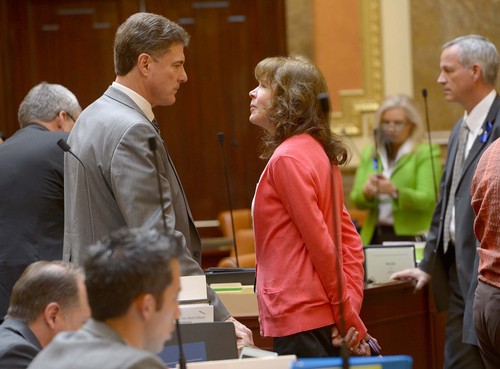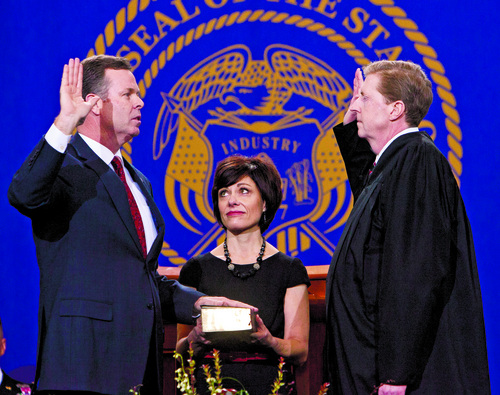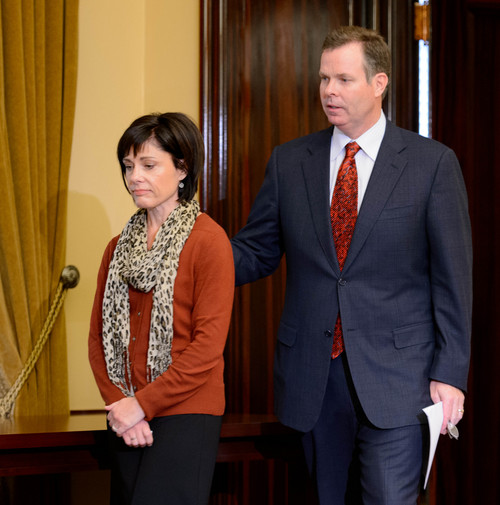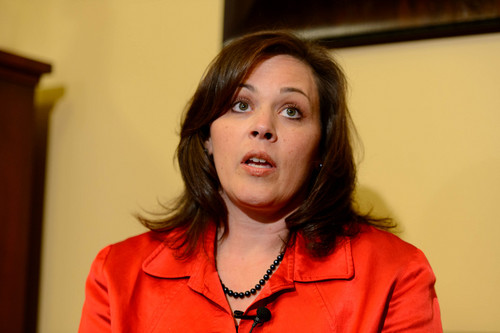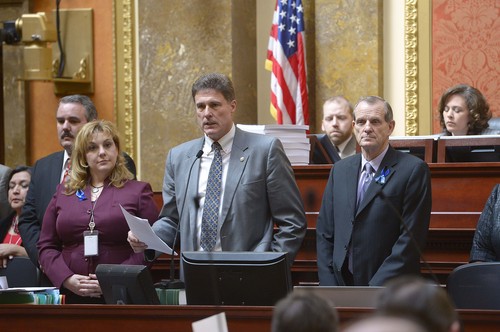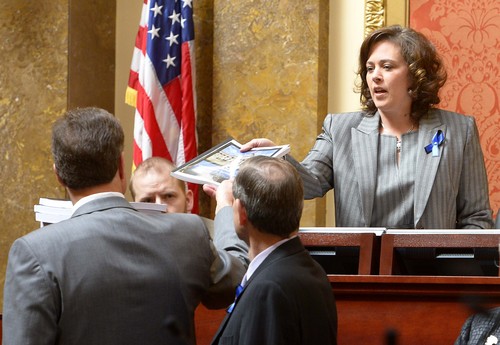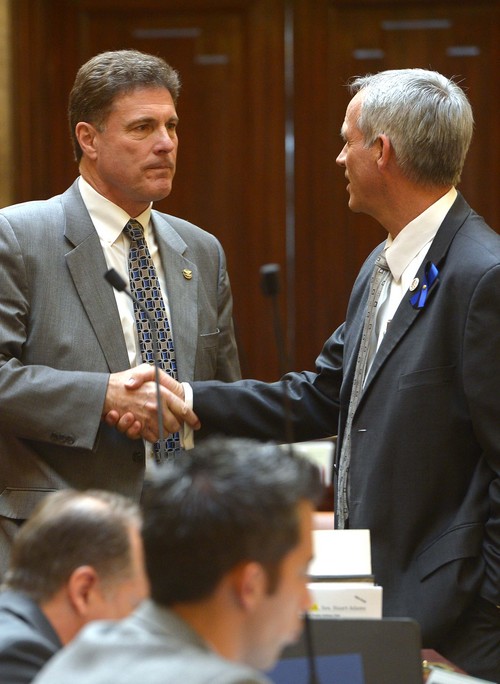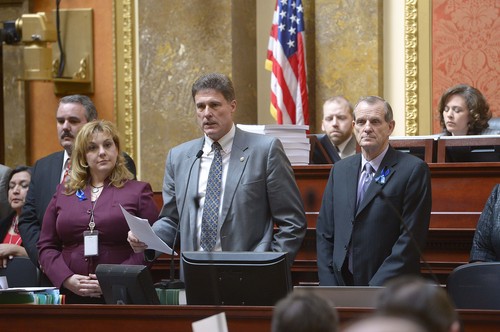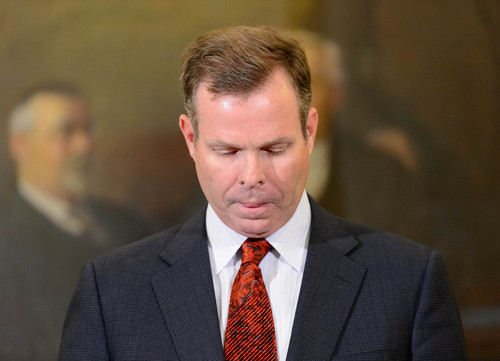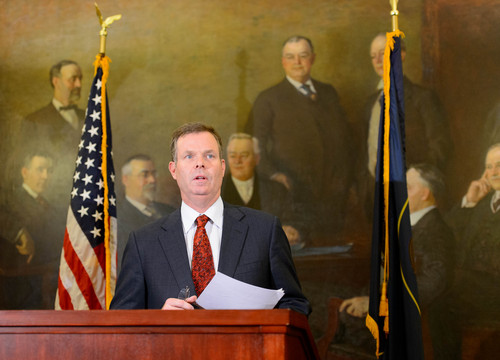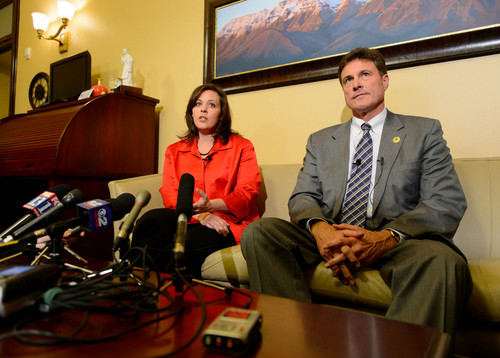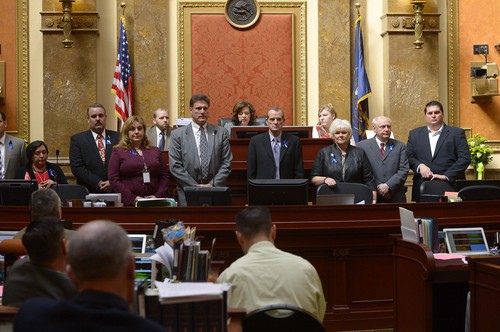This is an archived article that was published on sltrib.com in 2014, and information in the article may be outdated. It is provided only for personal research purposes and may not be reprinted.
A damning report from a House committee concluded Wednesday that former Utah Attorney General John Swallow hung a "For Sale" sign on the door of the office, doing favors for wealthy supporters and friends, compromising Utahns' interests and damaging the integrity of the justice system in the process.
"The corruption of any public office through pay-to-play schemes is unacceptable. The corruption of the office tasked with administering equal justice under law is intolerable," the House Special Investigative Committee wrote in the unanimous report.
The report called Swallow's behavior "an egregious abuse of public trust that implicates numerous criminal prohibitions." It suggested criminal investigators carefully scrutinize the findings.
"The Committee believes that those responsible for these abuses must be held accountable in the investigations that continue," the report said.
The 206-page report, with more than 3,700 exhibits, was released just after 11 a.m. Wednesday and culminated months of investigative work that cost taxpayers roughly $4 million.
"Investigating a duly elected official is the most serious business this House can do," House Speaker Becky Lockhart said. "I'm proud to say we responded with an unwavering commitment to find the truth. … It was a high cost but we cannot put a price on public trust. One does not cut corners when the very integrity of our justice system is at stake."
The report reiterated the broad findings the committee detailed during two days of hearings in December, primarily that Swallow fostered a pervasive "pay-to-play" culture and followed a pattern of document fabrication and destruction meant to conceal his dealings. The committee cited a network of political committees meant to launder and hide hundreds of thousands of dollars of campaign contributions.
"The Committee concludes that Mr. Swallow hung a veritable 'for sale' sign on the Office door that invited moneyed interests to seek special treatment and favors," the committee wrote.
In a letter to the committee, Swallow's attorney, Rod Snow, called that characterization "absolutely false."
"[The claim] is simply untrue and an unfounded distorting of the facts," Snow wrote. "As much could be said of committee members who accept support from various groups and businesses."
Snow noted the U.S. Department of Justice and the Utah State Bar investigated Swallow declined to take action, although the bar said Wednesday it was re-opening its investigation based on the House committee's findings.
"We suggest that is where this matter should have been left," Snow wrote. "It should have been left with and for those investigations that were impartial, and void of political implications."
A portion of the report touched on Swallow's efforts to help raise money for U.S. Sen. Mike Lee, helping to bundle contributions from friends of Jeremy Johnson, a St. George businessman who used his Swallow connection to seek favors from the office and later was indicted by federal prosecutors.
In a February 2010 email recovered from Swallow's crashed hard drive, which the committee obtained this month, Swallow asked then-Attorney General Mark Shurtleff: "can i [sic] introduce Mike Lee to Jeremy Johnson?" Shurtleff responded: "Sure."
By June of that year, Johnson had apparently arranged for thousands of dollars of contributions to Lee's campaign. In an email that month, Swallow notified Johnson that checks to the Lee campaign from four of Johnson's associates — which the report said totaled $9,600 — had bounced. Swallow forwarded the exchange to the Lee campaign, a suggestion, the report said, that Swallow was coordinating his efforts with the candidate's campaign.
The report also revealed several new emails that showed Swallow's intimate involvement in helping to coordinate the raising of hundreds of thousands of so-called "dark money" — unreported funds, moved through a series of nonprofits to avoid having to report the donors, many of which were payday lenders.
Tens of thousands of the dollars were used to batter and ultimately unseat Rep. Brad Daw, R-Orem, who had sponsored legislation regulating the payday industry.
In one email, Swallow's political consultant, Jason Powers, alerted Swallow that "Brad Daw knows we after [sic] him." Nonetheless, Swallow later told Daw he had nothing to do with the attacks.
"He shamelessly lied to me," Daw said Wednesday.
Most troubling, Daw said, was that he sponsored legislation for the attorney general's office, at Swallow's behest, and took a political beating publicly for it. He considered Swallow a friend.
"That was devastating to me that someone could engage in that level of disloyalty," Daw said. "You want to think better of people than that."
Beyond that, the report reiterated and expanded on several findings that investigators revealed in two days of hearings in December.
It concluded that Swallow provided Johnson favored access to the office and worked with him to create a legal opinion supporting Johnson's business processing online poker payments.
Swallow committed to his friend and "patron" Richard Rawle he would be an ally of the payday lending industry, and concealed vast amounts of money from that industry that were used to fund attack ads against Swallow's opponents.
In addition, the former attorney general compromised the attorney general's office and the state in a foreclosure lawsuit by attending a fundraiser hosted by the plaintiff in the suit, then trying to cover up the conflict by dismissing the case.
"With the assistance of his predecessor as Attorney General, Mark Shurtleff, [Swallow] sold out the interests of thousands of Utah homeowners who would have benefitted if the office had continued to pursue the case," according to the report.
Gov. Gary Herbert said Tuesday restoring the public's faith in the office was worth the time and money spent on the investigation.
"I don't know that we can overemphasize the importance of solving the problems we had in the attorney general's office, and it's an unfortunate circumstance, a disappointment for many people that we had the problem in the first place," Herbert said.
Investigators shared their findings with Salt Lake County District Attorney Sim Gill and Davis County Attorney Troy Rawlings, who, in conjunction with state and federal investigators are conducting an ongoing criminal investigation into Swallow, Shurtleff and others.


